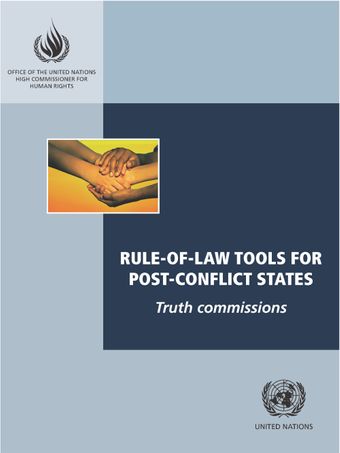Introduction

- Author: United Nations
- Main Title: Rule-of-law Tools for Post-conflict States , pp 1-3
- Publication Date: March 2013
- DOI: https://doi.org/10.18356/04ed38e9-en
- Language: English
- Previous Chapter
- Table of Contents
- Next Chapter
It is increasingly common for countries emerging from civil war or authoritarian rule to create a truth commission to operate during the immediate post-transition period. These commissions— officially sanctioned, temporary, non-judicial investigative bodies—are granted a relatively short period for statement-taking, investigations, research and public hearings, before completing their work with a final public report. While truth commissions do not replace the need for prosecutions, they do offer some form of accounting for the past, and have thus been of particular interest in situations where prosecutions for massive crimes are impossible or unlikely— owing to either a lack of capacity of the judicial system or a de facto or de jure amnesty. As described below, the work of a truth commission may also strengthen any prosecutions that do take place in the future.
© United Nations
ISBN (PDF):
9789210576710
Book DOI:
https://doi.org/10.18356/c6c190b2-en
Related Subject(s):
International Law and Justice
Sustainable Development Goals:
-
From This Site
/content/books/9789210576710c003dcterms_title,dcterms_subject,pub_keyword-contentType:Journal -contentType:Contributor -contentType:Concept -contentType:Institution105
/content/books/9789210576710c003
dcterms_title,dcterms_subject,pub_keyword
-contentType:Journal -contentType:Contributor -contentType:Concept -contentType:Institution
10
5

